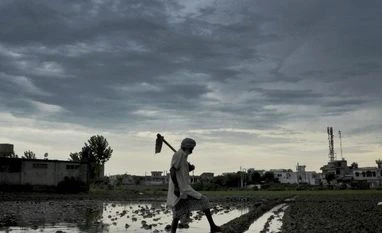Unseasonal rains, accompanied by strong winds and hailstorm, continued to lash vast swathes of North and Central India on Monday, increasing the anxiety of wheat growers who were about to harvest their standing crop. And the government, which has been trying hard to tame inflation for a while now, also took note of it.
It acknowledged Monday that there has been some damage to the crop, but added that there is no concern about mustard and chickpea (chana) crops which have been harvested.
The weather has taken an about turn in the last few days.
Experts were concerned about a drop in wheat yield due to the heat wave just a few days ago. And on Monday, mercury in several states registered a considerable dip due to continuous rain -- which also poses a threat to mustard, chana, sugarcane, seasonal vegetables and horticulture crops.
The government also said that localised hail storms might have affected some horticulture crops like banana and potato.
But the good news is that the weatherman is of the view that the rains will recede from Tuesday onwards. India Meteorological Department (IMD) has predicted significant reduction in rainfall, thunderstorm and hailstorm activities over North-west and East India from today.
But, another weather system is developing which might cause another round of unseasonal rain and hailstorm from March 24 onwards over Punjab, Haryana, western UP, North Rajasthan and Delhi.
“This new bout of rain will be due to another western disturbance that is expected to develop from March 23 night,” Mahesh Palawat, vice president meteorology and climate change in private weather forecasting agency Skymet, told Business Standard.
The biggest impact of the rain and hailstorm is expected on standing wheat crops particularly those which had ripened and were ready for harvest.
“Early sown wheat crops in Haryana, Punjab, Uttar Pradesh and Rajasthan have been impacted in the rain which will deteriorate the seed quality and might result in pushing up prices of good quality wheat,” said Rahul Chauhan, commodity analyst at iGrain India.
“All over MP, farmers are aggressively harvesting wheat and the recent bout of rains will bring down the quality which will fetch less price in the markets,” said Bhagwan Meena, founder member of Rashtriya Kisan Mazdoor Mahasangh, a Madhya Pradesh based farmers group.
For the last few days, state governments have also swung into action assuring farmers of compensation for the damages suffered and promised to undertake surveys to assess the loss.
In UP, Chief Minister Yogi Adityanath directed officials to undertake surveys to assess the loss and promptly compensate the farmers, while in Gujarat, Chief Minister Bupendra Patel held a high-level meeting on Sunday to review the situation, while in Madhya Pradesh and Telangana, the state administration swung into action due to incessant rains and hailstorm in main wheat growing areas.
In Rajasthan, Lok Sabha speaker Om Birla toured the rain-affected regions of Bundi, while the state administration assured compensation.
Speaking to PTI, Union Minister of State for Agriculture Kailash Choudhary said the state governments are utilising the funds under the State Disaster Relief Fund (SDRF).
“There has been some damage. We have not received an assessment report on the extent of damage from the state governments,” Choudhary said.
The minister asserted that the central government will provide compensation under the National Disaster Relief Fund (NDRF) if the state governments submit a report after assessing the extent of damage.
Agriculture Commissioner PK Singh said even if some percentage damage happens in two lakh hectares of wheat area it would hardly have any impact considering the total wheat acreage of over 34 million hectares in the current year.
Singh said some of the horticultural crops are likely to have been impacted in areas with localised hailstorms. For example, banana and potato crops. Potato farmers have been asked to halt harvesting.
Meanwhile, IMD has advised farmers of Punjab, Haryana and Madhya Pradesh to postpone harvesting of wheat and other rabi crops, while the met had advised farmers to harvest crops like mustard and chickpea in some states at the earliest and store them at safe places. Farmers have also been asked to withhold irrigation to wheat crops to avoid lodging.
Unlock 30+ premium stories daily hand-picked by our editors, across devices on browser and app.
Pick your 5 favourite companies, get a daily email with all news updates on them.
Full access to our intuitive epaper - clip, save, share articles from any device; newspaper archives from 2006.
Preferential invites to Business Standard events.
Curated newsletters on markets, personal finance, policy & politics, start-ups, technology, and more.
)